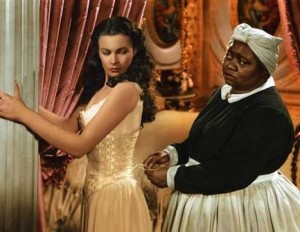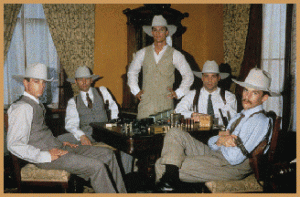FRANKLY, MY DEAR: GONE WITH THE WIND REVISITED by Molly Haskell (New Haven/London: Yale University Press), 2009, 244 pp.

I’m glad that Armond White gave this book a favorable review in the New York Times, which it clearly deserves. But I wish he hadn’t muddied his kindness with lazy misinformation and lazier prose.
Misinformation: “Haskell gave up regular reviewing in the early ’90s, leaving criticism that seriously examined the big-screen image of women and the popular representation of female social roles to go underground — into academic studies where abstruse, tenure-seeking jargon is used to rebuff popular taste.” I’m not aware that Haskell ever left the kind of criticism White describes; unless one decides to make a very big deal out of her brief stint of teaching, she certainly didn’t go into “academic studies”, abstruse, jargony, or otherwise; and if White knows something that the rest us don’t about her rebuffing of popular taste, I wish he’d enlighten us further on this subject.

Prose: “Haskell intertwines her own history with Mitchell’s Georgia background, Leigh’s British origins and Selznick’s Jewish American determination.” (Whenever White gets around to identifying Haskell’s abstruse, jargony rebuffing of popular taste, he might also explain what Jewish American determination consists of — unless Haskell explains this herself, which I doubt. Read more
From the Chicago Reader (April 10, 1998). — J.R.
The Newton Boys

Not to be hyperbolic, but Richard Linklater’s first big-budget movie may be the Jules and Jim of bank-robber movies, thanks to its astonishing handling of period detail and its gentleness of spirit, both buoyed by a gliding lightness of touch. Linklater, Clark Lee Walker, and Claude Stanush (who also worked on the script of Nicholas Ray’s The Lusty Men) have adapted Stanush’s oral history about the Texas-born Newton brothers, who between 1919 and 1924 became the most successful bank robbers in the U.S. The film may occasionally bite off a few more narrative strands than it can chew, but that’s merely the flip side of its generosity and energy. You can keep your L.A. Confidential; here’s a vision of the American past that I’m ready to climb inside. Matthew McConaughey, Skeet Ulrich, Vincent D’Onofrio, and Ethan Hawke play the brothers; with Dwight Yoakam and Julianna Margulies. 600 N. Michigan. — Jonathan Rosenbaum
 Read more
Read more
Written for a collection edited by Adam Cook, Making the Case: Contemporary Genre Cinema, whose publisher belatedly changed his mind about publishing. This is the article’s first appearance, although it’s also reprinted in my latest book, Cinematic Encounters 2: Portraits and Polemics. — J. R.

Out of his half-dozen comedy features to date as producer-writer-director — Terms of Endearment (1983), Broadcast News (1987), I’ll Do Anything (1994), As Good as It Gets (1997), Spanglish (2004), and How Do You Know (2010) — James L. Brooks has had three big commercial successes (the first two and the fourth) and three absolute flops (the third, fifth, and sixth). And because all six of these movies are concerned equally with personal failure and personal success, functionality (emotional and professional) as well as dysfunctionality (emotional and professional), it somehow seems fitting that each one has represented a highly ambitious as well as a highly risky undertaking.
The above paragraph has the disadvantage of making Brooks seem so unexceptional as a commercial filmmaker that one might wonder, on the basis of this description, whether he’s worth examining at all. Some might also question whether all six of his movies qualify as comedies, despite Brooks’ own insistence that they do. Read more





